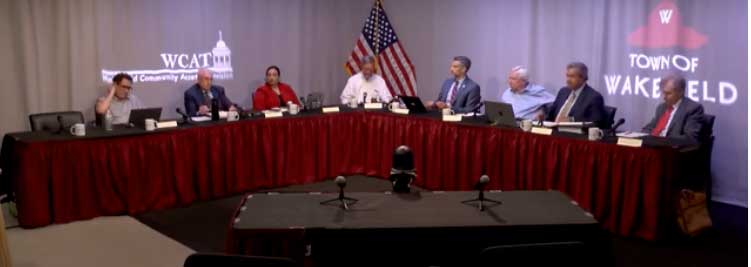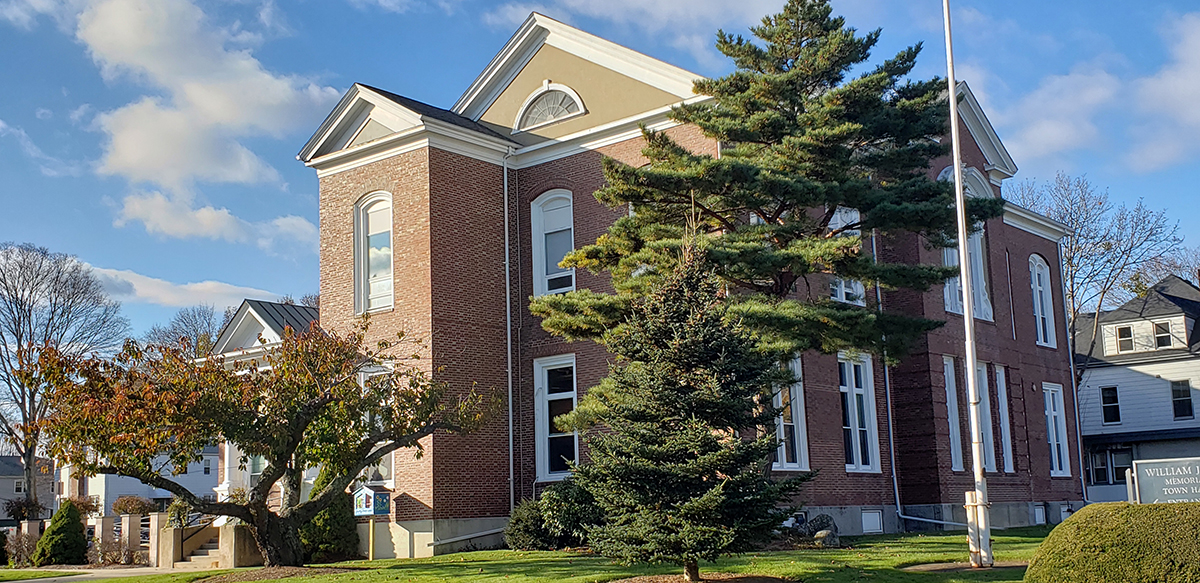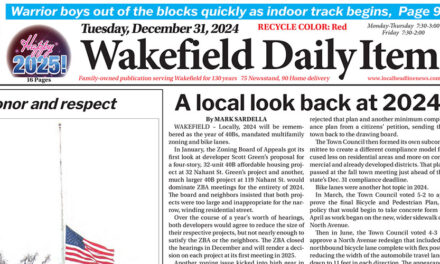
The Town Council discussed net-zero goals and the town’s status as a “Climate Leader” at its June 24, 2024 meeting,.
By MARK SARDELLA
WAKEFIELD – Town Administrator Stephen P. Maio provided an update on Wakefield’s participation in the state’s “Climate Leader Communities” program at this week’s Town Council meeting. Supporters and critics of the program among the Council members took the opportunity to air their views once again.
Last April, the Town Council voted to pursue a “Climate Leader Communities” technical assistance grant that requires Wakefield to, among other things, commit to eliminating fossil fuel use in municipal buildings and operations by 2050, create a municipal “decarbonization roadmap” and adopt a zero-emission vehicle first policy.
The technical assistance grant would provide a consultant to help Wakefield to create a “decarbonization roadmap” for the town, which is one of the requirements of the Climate Leader Communities program.
Maio said that the town has already met several of the other Climate leader Communities qualification criteria. Wakefield is already designated as a “Green Community,” and the town has a local body (The Environmental Sustainability Committee) that advises the town on clean energy/climate initiatives. The town met another requirement when Town Meeting adopted the Specialized Energy Code. The town must also commit to a Zero-Emission vehicle policy and commit to eliminating fossil fuel use in public buildings by 2050.
Maio said that the town learned in May that it had been awarded the technical assistance grant. He said the reason he waited to bring it back to the board for discussion was because he was expecting to receive some kind of contract, which typically happens with state grants.
It turns out, Maio explained, that the state contracts directly with a multinational green company called ICF, which will in turn provide the consulting services to the town.
Maio said that he met with the consultant and Green Communities Regional Coordinator Dillan Patel a couple of weeks ago. He said that Patel told him directly that the grant came with no specific obligations other than to create the decarbonization roadmap.
Town Councilors noted that this seemed at odds with what they were initially told – that the town was obligated to meet strict and costly certification requirements as a condition of accepting the grant. But Maio indicated that the town would just lose its Climate Leader designation and be ineligible for certain grants if it did not continue to move forward with the program.
Maio outlined the town’s future goals as a Green Community for electrification the town’s fleet of vehicles, getting to 5 percent by 2027, 20 percent by 2030, 75 percent by 2040 and 100 percent EVs by 2050.
Maio admitted that electric vehicles are more expensive but said that being a Green Community would help with securing grants to offset costs.
He said there would be a need for planning to meet green goals for future vehicle and building upgrades. He added that the town would need to be able to get grants to offset costs until the technology catches up.
Town Councilor Edward Dombroski pointed out that these initiatives are very costly and involve technologies that are questionable. He said that there are reasons that green goals are being pushed further into the future.
“A zero-carbon footprint is not realistic,” he said. “We are setting ourselves up to incur significant costs for sub-par technology.” He said that he was all for conservation and being aware of climate issues but stressed the need to also be aware of the cost to taxpayers.
“We are getting way ahead of ourselves,” he insisted, noting that the technical grant comes with requirements that must be implemented.
Town Councilor Douglas Butler was also skeptical.
“I want no part of the Climate Leaders discussion,” he said, adding that it “seemed like a bit of an overreach.” He said that the town did not need to be on the “bleeding edge” of these efforts. He called the idea of Wakefield solving the climate crisis “fantasy.”
But Councilor Jonathan Chines denied that the town will incur significant obligations, asserting that any changes would have to come back to the Town Council.
Chairman Michael McLane recalled that the Environmental Sustainability Committee had told the Town Council that accepting the grant would obligate the town to do certain things. But Maio said that he was told by Patel that the town would simply lose its “Climate Leader” status.
Councilor Robert Vincent pointed to language that seemed to obligate the town to do certain things. He wondered if the town should go forward with its application to be a “Climate Leader.”
Town Counsel Thomas Mullen said that in the absence of a written contract the town would have no legal obligation.
“We can choose not to accept the consultant’s advice,” he said.





